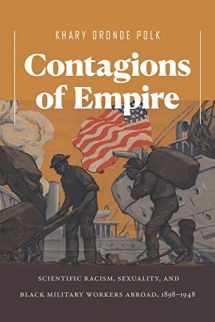
Contagions of Empire: Scientific Racism, Sexuality, and Black Military Workers Abroad, 1898–1948
Book details
Summary
Description
From 1898 onward, the expansion of American militarism and empire abroad increasingly relied on black labor, even as policy remained inflected both by scientific racism and by fears of contagion. Black men and women were mobilized for service in the Spanish-Cuban-American War under the War Department's belief that Southern blacks carried an immunity against tropical diseases. Later, in World Wars I and II, black troops were stigmatized as members of a contagious "venereal race," and were subjected to experimental medical treatments meant to curtail their sexual desires. By turns feared as contagious, and at other times valued for their immunity, black men and women played an important part in the U.S. military's conscription of racial, gender, and sexual difference, even as they exercised their embattled agency at home and abroad.
By following the scientific, medical, and cultural history of African American enlistment through the archive of American militarism, this book traces the black subjects and agents of empire as they came into contact with a world globalized by warfare.


We would LOVE it if you could help us and other readers by reviewing the book
Book review



